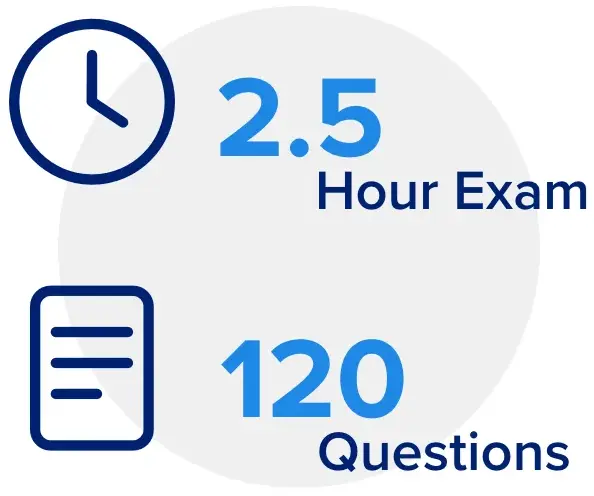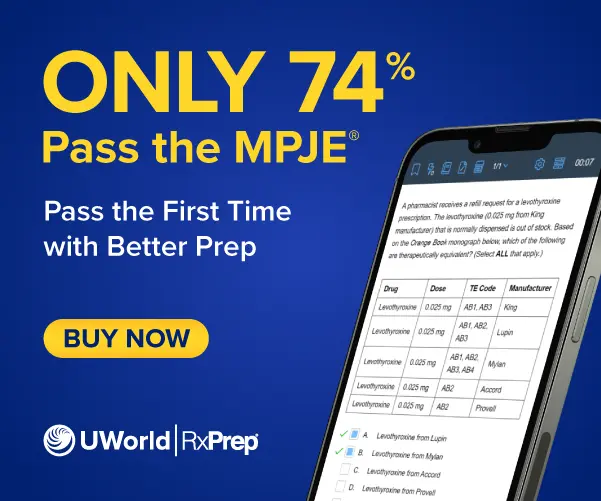The National Association of Boards of Pharmacy® (NABP®) developed the MPJE to assess candidates’ knowledge and ability to apply federal and state laws/regulations to the practice of pharmacy. This article discusses the MPJE and how to prepare for it to become a licensed pharmacist.
Why Take The MPJE & Who Can Take It?
Passing the MPJE is a prerequisite for obtaining a pharmacist license in most US states and the District of Columbia (Washington DC). To take the MPJE, you must be a graduate of a pharmacy school accredited by the Accreditation Council for Pharmacy Education (ACPE) or have earned your Foreign Pharmacy Graduate Examination Committee® (FPGEC®) Certification. You must also meet the eligibility requirements (e.g., internship experience) of the state or jurisdiction where you want to practice as a pharmacist.
The MPJE is not required in Alaska, Arkansas, Idaho, Michigan, Vermont, or California. However, in order to practice pharmacy in the state of California, applicants must pass the California Practice Standards and Jurisprudence Examination (CPJE). Be sure to visit each state board of pharmacy’s website for eligibility requirements, including required examinations.
MPJE Format and Structure
To perform well on the MPJE, it is vital to comprehend the exam's structure and how to respond to the questions. The MPJE is a 2.5-hour, 120-question computer-based exam. You are allotted an additional 20 minutes for reviewing the non-disclosure agreement, tutorial, and post-examination survey. Of the 120 questions, 100 are used to determine your exam result, and 20 are experimental (“pretest”) questions dispersed throughout the exam that do not count toward the final score.
Pretest questions are evaluated for use in future exams, and it is impossible to determine which questions are experimental and which are not. Every question should be approached as if it counts toward your final score. You cannot skip a question, and you must respond to each item in the order in which it is presented. After your selection has been submitted, you cannot go back to review or change your selections to previous questions.
The MPJE exam uses adaptive technology, meaning that as you answer questions, adaptive technology evaluates your responses and uses that information to choose your next test question.
The table below describes each question type and how to answer them to help you better prepare.
| Format | Required Response |
|---|---|
| Multiple-Choice Questions | Select the one best answer. |
| Multiple-Response Questions | Select all that apply. |
| K-type Questions | Select a combination of the options; one, two, or three of the options could be correct. |
What Is On The MPJE Exam?
The MPJE Competency Statements provide a blueprint of the exam's topics. A thorough understanding of the competency statements will help you prepare for the exam. The blueprint provides a breakdown of the testable knowledge, judgment, and skills you must show on the MPJE. Each state board of pharmacy focuses the MPJE to the specific laws and regulations governing pharmacy in that jurisdiction.
| Principal Topic Areas of the MPJE Competency Statements | ||
|---|---|---|
| Area | Topic | % of Test |
| Area 1 | Licensure/Personnel | ~22% |
| Area 2 | Pharmacist Practice | ~33% |
| Area 3 | Dispensing Requirements | ~24% |
| Area 4 | Pharmacy Operations | ~21% |
For more details about the MPJE Competency Statements, visit the MPJE Blueprint page.
MPJE Review Tips
To effectively prepare for the MPJE, you must be familiar with the laws and regulations governing the practice of pharmacy in the state or jurisdiction where you intend to practice by reviewing the state laws and regulations.
How long should you study?
Due to the unfamiliarity of specific laws and regulations impacting the practice of pharmacy, students are strongly advised to begin studying for the exam at least 1 to 3 months in advance. Check out our MPJE study guide for tips on how to make the most of your study time and ace your exam.
MPJE Requirements by State
Each jurisdiction has its own MPJE licensing requirements.
| States and Jurisdictions that require the MPJE | |||
|---|---|---|---|
| Alabama | Kansas | New Hampshire | South Dakota |
| Arizona | Kentucky | New Jersey | Tennessee |
| Colorado | Louisiana | New Mexico | Texas |
| Connecticut | Maine | New York | Utah |
| Delaware | Maryland | North Carolina | Virginia |
| Florida | Massachusetts | North Dakota | Washington |
| Georgia | Minnesota | Ohio | Washington DC |
| Guam | Mississippi | Oklahoma | Wisconsin |
| Hawaii | Missouri | Oregon | Wyoming |
| Illinois | Montana | Pennsylvania | |
| Indiana | Nebraska | Rhode Island | |
| Iowa | Nevada | South Carolina | |
Frequently Asked Questions (FAQs)
What should I take to the MPJE exam center?
The NABP recommends arriving at least 30 minutes before your scheduled appointment time. You must present two forms of identification, or you will be denied entry to the testing center:
- A photo ID that includes your signature
- A second form of ID with a signature
Names on primary and secondary IDs must match what is listed on the authorization to test (ATT) letter and your NABP e-Profile, including first, middle, last, and suffix. Review the Candidate Application Bulletin for name-matching requirements.
What happens if you fail the MPJE?
How many times can you take MPJE?
Do you have to take the MPJE for each state?
Which states do not require the MPJE for a pharmacist license?
Can I take MPJE before NAPLEX?
Read More About MPJE
Are you planning to take the MPJE Exam? You can find all the information you need about MPJE registration, eligibility, and cost in this article.
MPJE BlueprintAre you looking for the MPJE Blueprint? This article contains the MPJE Competency Statements and exam topics that you should be familiar with.
MPJE Scoring GuideInterested in learning more about MPJE scoring? This is our simple guide to MPJE scoring, average scores, and the rescoring process.
MPJE Study GuideAre you looking for expert advice on how to pass the MPJE? Check out our study guide, which offers in-depth information that can help you master the MPJE.




